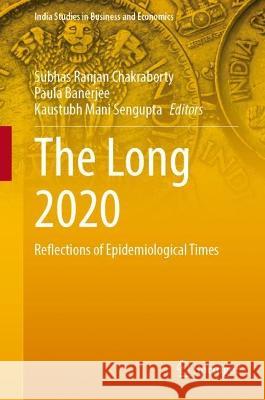


ISBN-13: 9789819948147 / Angielski
ISBN-13: 9789819948147 / Angielski
Introduction: Looking beyond the Immediate
Part I: Of Past and Futures of Studying Epidemics
1. Subhas Ranjan Chakraborty, Former Professor of Department of History, Presidency College & CRG, ‘‘Longue Durée’, ‘Conjoncture’, ‘Event’: Notion of Plural Time in History’
2. Paula Banerjee, University of Calcutta & CRG, ‘Locating the Diseased Body’
3. Kaustubh Mani Sengupta, Department of History, Bankura University, ‘Structure, Agency, Temporality: Revisiting Historical Analyses to Study the Contemporary’
4. Iman Mitra, Department of History and Archaeology, Shiv Nadar University, Delhi & CRG, ‘The Island of the Day After: Digital Epidemiology, Artificial Intelligence and a Futuristic Governmentality’
Part II: Global and Local Response to 2020
5. Byasdeb Dasgupta, Department of Economics, University of Kalyani & CRG, ‘Global Capitalism and Corona Pandemic – In Search for Radical Solution’
6. Amit Prakash, Centre for the Study of Law and Governance, Jawaharlal Nehru University & CRG, ‘The Long 2020/21 in India: Models of Pandemic Management and Logistics of Governance’
Part III: Refugees and Labouring Lives
7. Priyankar Dey, CRG, ‘Politics of Health in Post-Partition Calcutta: the Refugees, the Left movements and the Question of Life in the City’
8. Jyothi Krishnan, Department of Disaster Management, Loyola College of Social Sciences, Trivandrum, and Prasad R, Department of Sociology, University of Calicut, ‘Guest Workers in Kerala: Is Welfarism Enough?’
9. Sabir Ahamed, Pratichi (India) Trust and Calcutta Research Group, and Madhurilata Basu, Department of Political Science, Sarojini Naidu College & Calcutta Research Group, ‘Long 2020 and the Informal Care Economy: Case studies of select Careworkers’
Part IV: Literature and the Literary World
10. Samata Biswas, Department of English, The Sanskrit College and University & CRG, ‘Epidemic and Bangla Literature: Tropes, Traces, Topographies’11. Ritu Menon, Women Unlimited & CRG, ‘Books — and the Time-Warp of Long-COVID’
Subhas Ranjan Chakraborty was a member of the West Bengal Education Service from 1968 to 2005 and taught at Darjeeling Government College, Maulana Azad College, Hooghly Mohsin College, Jhargram Raj College and Presidency College. He has edited a few volumes of essays in English and Bengali and contributed several essays to edited volumes and academic journals.
Paula Banerjee is currently IDRC Endowed Research Chair, Asian Institute of Technology Thailand. She is professor (on lien) at the University of Calcutta and a member of the Calcutta Research Group. She is best known for her work on women in borderlands and women and forced migration. She served as the vice-chancellor of the Sanskrit College and University. Winner of many awards and accolades, in 2013, she was awarded the Distinguished Fulbright SIR Award and a Visiting Professorship to SUNY, Oswego. Acknowledged as a radical and prolific speaker, she has delivered lectures in all five continents.
Kaustubh Mani Sengupta teaches at Shiv Nadar University, India. His research focuses on urban history of South Asia, early colonial state in India, history of infrastructure and space. He has co-edited ‘Rethinking the Local in Indian History: Perspectives from Southern Bengal’ and ‘Itihaser Bitarka, Bitarker Itihas: Ateeter Bharat O Ajker Gabeshona’ [in Bengali]. His research articles have appeared in journals like The Indian Economic and Social History Review, Studies in History, Economic and Political Weekly, South Asia Research, History Compass, etc.
This book looks at the current crises of life and livelihood following the global epidemiological crisis and various strategies to manage them as a long unfolding of past trends and future possibilities of epidemiological governance, restructuring of global economy, public health, systems of protection and care and the role of state in that, and precarities of the migrants and the refugees. It brings together scholars from different fields to think of our present in the time of COVID-19 pandemic in a longer temporal frame. The essays compiled in this book investigate issues mentioned above, covering a period from the colonial past to the postcolonial present with an aim towards encouraging scholarly debates on protection, care and justice. Although the experiences of last two years have inspired some very important academic and scholarly interventions, this book compiles original research to contextualise the present in a longue duree framework and arrive at a more complex understanding of it. It is a must-have resource for researchers of developmental studies especially in the above mentioned areas, as well as policy makers, think tanks and other non-governmental organizations interested in these areas.
1997-2026 DolnySlask.com Agencja Internetowa







